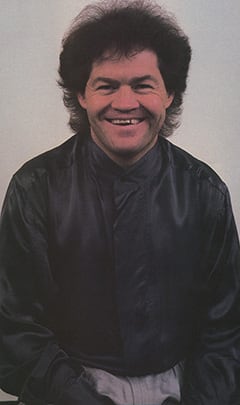
(I proceed to Micky’s room, which is a far cry from the quiet solitude of Peter’s environment. The door is opened by Ellie, the nanny who cares for Micky’s three preschool-aged daughters, Charlotte, Emily and Georgia. I meet Micky’s wife, Trina, as well as Trina’s sister, before Micky emerges from the bathroom. The three little girls are playing on the floor by the bed. All three are almost mirror images of seven-year-old Mickey Braddock, who I remember as Circus Boy on Saturday morning TV when I was about their age.
Of the three current Monkees, Micky seems to be the happiest. I mean, the guy strikes me as being pretty ecstatic with his life. He’s friendly, jovial and just as gracious as when I interviewed him during the summer, even though he’s recovering from a bad cold and coughs throughout the interview. Trina plays with the three girls, as Micky and I sit on the end of the bed and begin the interview. The girls make lots of noise, as children their age are apt to do (the funniest comment I can pick up on my tape is this delightful British little girl accent saying, “Mummy, I want to see Davy sing and dance”)—and the baby even crawls on Micky’s lap, chanting “Daddy, daddy, daddy” during the middle of the interview. I get the impression Micky wouldn’t have it any other way…)
You came to Michigan the wrong season this time. It’s so cold outside.
Micky Dolenz: Yeah. Well, it reminds me of home, this. I love the cold weather, actually.
Do you really?
Dolenz: Yeah, it gets you more…
Invigorated?
Dolenz: Yeah.
Did you ever get to see a copy of the article?
Dolenz: Yes, I did. That was great. It’s a nice magazine.
Trina: That was a while ago, wasn’t it?
Dolenz: Yes, it was.
Well, I asked you so much last summer…
Dolenz: I know.
There’s not a whole lot left to ask you. But it sure is nice to meet you in person. This is a thrill.
Dolenz: Well, thank you very much.
I just interviewed Alice Cooper a couple of weeks ago, and he said to say “hi” to you.
Dolenz: Oh, really?
He said you guys were all part of a drinking group in L.A. for awhile with John Lennon…
Dolenz: We hung out quite a bit. Yeah, Alice and I used to live right across the street from each other. We were neighbors. In fact, there was a house being sold right next to me, and I told him about it, and he went and bought that. We played golf a lot. He was a big golfer. I had a little studio in my house in the basement, and he did all his demos for an album and wrote all the songs down there. In fact, I have the original lyrics to “Only Women Bleed” scrawled out on the back of a pizza box. I’m going to frame that one day. We hung out quite a bit. We had a baseball team, a softball team called the “Hollywood Vampires.” I’m so glad to hear he’s back and doing well.
Did you know him before that Flint I.M.A. concert you performed at with him or was that the first time you met him?
Dolenz: No, I knew him before that. But actually not as Alice Cooper. He was…
Vince Furnier.
Dolenz: Yeah, just Vince. And he was living across the street with his band.
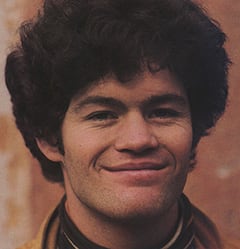
I know you’re a director, living in England now. But between the end of the Monkees and the time I saw you perform with Alice Cooper, what were you doing during that period? Was it tough being an ex-Monkee?
Dolenz: Yeah. It’s tough being an ex-anything. When you achieve that level of success in almost any endeavor, it’s a tough act to follow. People expect more and better, which is nearly impossible. Or you crumble under the strain, which we’ve seen happen with many of our contemporaries. I think I was fortunate because I went through a similar sort of experience when I was young with my Circus Boy series. Having gone through it and not really noticing—because when you’re that age, kids are very resilient, things go by you so fast—it just kind of prepped me for it, I think. And even though I didn’t know it at the time, a few years later I looked back and realized that it had probably helped save my ass in many ways. But it’s a double-edged sword, you know. It’s like a paradox. After the Monkees, I couldn’t really get a job doing what I wanted to do—which was act. And I didn’t really want to act anymore, either, because it had been 20 years at that time. That’s a long time to be in a career at any age. So people thought I was either a drummer trying to be an actor, or they thought I was an actor trying to be a director. So it was difficult, compounded by the fact that you’re always a bit of furniture in your hometown anyway, and L.A. was my hometown. I’d been around for a long, long time, and Hollywood is very fickle. The business is very fickle. So, yeah, it was tough.
But would I have given it up? Would I have traded it in? Absolutely not. As I say, it’s all part of the cycle, you know. You have to take the bad with the good. And The Monkees was so successful. It made me such a major star that how could you ever… It’s like people always expect you to badmouth it in a way. You know, “Do you have any regrets?” Are you f------ kidding? F------ regrets? I’m a multimillionaire, fame and fortune. I mean, how could you have regrets? I have none. Well, I have one. I bought some antique cars once, which I shouldn’t have done. But I have very few. Anybody who looks back on any kind of success like that—regrets or badmouthing is ridiculous.
Peter just said basically the same thing. Looking back in retrospect, he says he thinks he may have been wrong regretting what the Monkees were back then.
Dolenz: Yeah. And having moved to England, seeing a bit of the rest of the world and traveling a lot, it did a lot for widening my perspective. I mean, if you just live in Hollywood all your life and you’re stuck in that business and that lifestyle, then people perceive not having a pair of Reebok tennis shoes as a failure. You know, that is the end of the world for people in Hollywood. And they perceive it and have almost the same emotional response to that as if they went bankrupt, or lost a job or lost a child. It’s a very, very strange place in that respect. It’s not reflective of real life at all. But very few factory shops are, and that’s what it is. Essentially the whole city revolves around this one business, certainly at least the central area does. And everywhere you go in any line of work—whether you go to the dentist or the gas station, the dental recepitonist [sic] or the guy pumping gas is really an actor waiting for their big break. So the whole city revolves around the business in that sense. You very seldom meet someone who doesn’t really want to be an actor or a director or a writer. Which is fine. It creates an awful lot of competition, which is healthy for the business. On the other hand, it’s a very strange way of living. It would be like living on the floor of GM Motors, if that was your home, eating and sleeping there.
So you don’t miss Hollywood at all?
Dolenz: Oh, no, not to live. I work there. And I always have. I’ve always had connections. Not so much in the last 10 or 12 years, but by no means have I shut myself off. I mean, I’ve always had representation there. I’ve always had interests, and I’ve gone there at least two or three times a year for the past 10 or 12 years. Short little trips, finding ideas, getting scripts. For instance, the major coup I pulled off was getting Fernwood Tonight and remaking it in England.
Oh, really? I didn’t know that.
Dolenz: Well, you wouldn’t. Very few people in America do.
Well, that’s a great piece of trivia.
Dolenz: Yeah. So it’s good to know what’s happening in the States. And it works both ways. I’m also bringing shows from England over to the States. I’m determined to do The Young Ones, re-do it over here. I think it’s going to be a bitch. Have you ever watched the show?
I’ve seen it a couple of times on MTV.
Dolenz: You’d never get that on network TV in the States, I don’t think. I’ve worked with all those guys as well. I produced their first two movies. My company produced the first two films they did as a sort of comic strip. It was kind of an English “Comedy Store” improv company. But I did Fernwood Tonight for instance, sold it to England and remade it there. And I worked on Nesmith’s show there, shot some stuff for him.
Elephant Parts?
Dolenz: No, TV Parts. And Spitting Image, those puppets.
Oh, you were involved in that?
Dolenz: Yeah, oh, yeah.
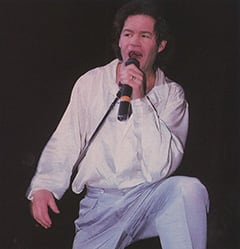
That’s great. I saw the one they did over here in America. Is it true that you were the voice of Scooby-Doo?
Dolenz: I don’t know how that started, that rumor.
Trina: You were!
Dolenz: No, darling. I’m not the voice of Scooby-Doo. I’m the voice of one of the characters, and I don’t even remember the name of the character.
Trina: Well, you still get residuals from it. I think you were a doctor-type person on it.
Dolenz: Was I? No, I don’t know how the rumors started that I was Scooby-Doo. The guy that did the dog—oh, dear, I wish I could remember his name. He had a very, very clever voice. I did quite well doing that, though.
Did you really try out for the role of Fonzie on Happy Days?
Dolenz: Oh, yeah. That’s a great story. After The Monkees, I went up for few interviews, and that was one of them. They were desperate for a summer replacement show. Some show fell out, and this was like something that came in through the backdoor. It’s funny because this is typical—nobody had great hopes for it. It was like “Quick, we need something.” That gives you an idea of how Hollywood works. And they only brought in about three or four of us. They didn’t have time to do massive, big auditions. They brought three or four of us in, Henry (Winkler) and I being two of them. There were a couple of other guys, but I don’t remember who they were. And Henry tells the story of sitting in the reception area with me, and thinking, “Oh, shit. There’s no f------ way I’m ever going to get this part because Micky Dolenz is sitting here.” But I knew immediately that it wasn’t me. I tried my best, but I did a caricature of the character it was supposed to be. And I knew at the time that I wasn’t right for it. He was perfect. I didn’t even know him at the time. But seeing the show later on, it was very obvious that he was perfect for the part. You had to be essentially from Brooklyn, or at least an Easterner, and I was trying to pretend, doing a carcicature [sic] of it, whereas he really was it.
In The Monkees Tale book, there was something about a “jam session” that you, Stephen Stills and Jimi Hendrix did in a hotel room. Did that really happen?
Dolenz: Yeah, a number of times. Of course, he was our opening act on the tour. I found him in New York. You’ve heard that story?
No. I didn’t hear all the details.
Dolenz: Oh, you didn’t? Well, I was in New York, it must have been ’67, and somebody said you gotta go hear this guitar player. He plays with his teeth. He was playing with the Albert Hammond Group at the time. And so I went down to the Bottom Line or somewhere down in the Village, and there he was playing guitar with his teeth. I thought, “Wow! Great!” And then, God, I guess it was six or eight months later, I was at the Monterey Pop Festival, and simultaneously we needed an act. And the Jimi Hendrix Experience got up onstage, and I said, “I know that guy! He was playing guitar with his teeth in the Village.” Our producer said to us, “Well, you need an opening act,” and I though [sic] he’d really be great. He was really colorful and psychedelic, and I was really into that at the time. So we hired him, and he opened for us on quite a few dates. He broke his record, “Purple Haze,” I think it was.
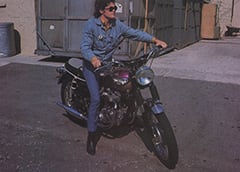
Right.
Dolenz: Was that his first hit?
Yeah.
Dolenz: He broke that on the road. And then he got to New York, and Bill Graham asked him if he wanted to headline in a more psychedelic venue. I don’t remember where now. But anyway he was offered a headlining gig, and he asked to be released from the tour. And we, of course, said “Yes.” Because in those days, it didn’t make any difference who the opening act was. It was tough on him. It wasn’t easy for him to get out there and (imitates Hendrix), “Foxy Lady, oh!” (In a high-pitched falsetto) “We want the Monkees! We want the Monkees! Davy! Davy!” (In Hendrix voice) “Purple Haze was in my brain…” (falsetto) “Davy Davy!” It could be very embarrassing. It was terribly embarrassing for us. We showed up every night. He was one of the opening acts that we showed up every night to watch the whole opening set. He was just incredible.
That’s great.
Dolenz: Yeah. And Stills used to hang out because he was a good friend of Peter’s, and then eventually of all of ours. So we took a massive entourage on the road with us in those days. Stephen used to come with us. David Crosby, Graham Nash, Jan from Jan & Dean after the accident. Who else?
How did Zappa and Jack Nicholson get involved with the Monkees?
Dolenz: Well, Zappa was a fan, essentially. Mike met him somewhere, and he saw what we were doing, and wanted to be a part of it, and he was on the show. He was a big fan. In fact, he asked me to be his drummer after the Monkees were finished.
Really?
Dolenz: Yeah, he wanted me to drum for the Mothers Of Invention. Sometimes I wish I had. I couldn’t at the time because I was still under contract. This was just as we were breaking up. I was incredibly honored to have been asked. I was also a bit frightened because I didn’t really think that I could hack it. I’d only just learned to play the drums. But I was incredibly honored, a bit embarrassed. But, essentially, I couldn’t because I was still under contract to the company. I’ve always respected Zappa tremendously. I think he’s really a major player.
My brother and I were talking recently, and we decided it always seemed like you were the most rock ’n’ roll oriented of all the Monkees. It seemed like, from what you used to do onstage with the James Brown routine, and just the stories you’re telling today, that you were the Monkee who was more or less weaned on rock ’n’ roll.
Dolenz: Well, I suppose that’s true. Yes, I was weaned on rock ’n’ roll. Before the Monkees, I was in a group called Micky & The One Nighters. It was velvet lapels, and singing “Walkin’ The Dog.” I was the lead singer, and we did mostly Chuck Berry, James Brown, Little Richard. So those are my roots, and that’s where my heart is. That’s why I suppose I ended up singing most of the uptempo rock tunes with the Monkees. It was really by default because I don’t have any great voice to speak of.
I disagree. At least in the rock ’n’ roll sense.
Dolenz: Well, thank you, but I mean, you know…
In fact, we were recently marveling at your phrasing on “No Time.”
Dolenz: Well, thank you. But essentially those were my roots. Just the real ’50s rock ’n’ roll. And, as I said, that’s why I sang those songs, by default. Mike did—and does—have very country kind of sentiments. Peter was very folk-oriented at the time. He’s more rock now, but he was very folk-oriented. And Davy, of course, was very theatrical—Anthony Newley song and dance stuff. So I was the only one who would scream (laughs).
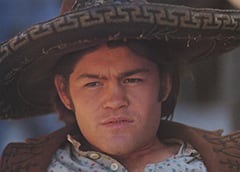
Did you play drums on a lot of Headquarters?
Dolenz: All of it.
All of it? That’s great.
Dolenz: Oh, yeah. But before that, I played a lot, too. But that was the first album that I played entirely. That was the first album that we did every note of every song. It was specifically to… well, it was really Mike and Peter who were vindicated there. Initially, I’d been hired as an actor. I was hired to play a part, though even in the auditions it was apparent that it wasn’t just an actor they wanted. They wanted a personality. They wanted four personalities. They wanted multi-talented people. The auditions were just as heavily weighted towards singing in my case. And I played the guitar for the audition. I played the guitar to “Johnny B. Goode,” actually. There was a lot of singing and a lot of music involved. But also acting, and also dancing—in the sense of being able to move. I mean, they wanted four personalities. They weren’t fools. They knew that on television you have to have that. That’s what television essentially does: it sells personalities. Situation comedy is misnamed. It’s not situation comedy; it’s the personalities that you tune in every week to see. The situations are always the same. Maybe that’s why they call it that.
That’s why if they’d have just hired a group, an already-existing group, and there was some talk at the time of doing that, it probably wouldn’t have worked. And there were other shows. I was up for three other shows at the time besides The Monkees. None of them were nearly as innovative. There was one show about a folk group, sort of like Peter, Paul & Mary. There was another show about a sort of Beach Boys kind of a group. Well, it wasn’t quite like the Beach Boys. It was more like… what was another group from that era? Kind of like a very conventional or rural… no, not rural… residential Kingsmen kind of group. Like Micky & The One Nighters were. The velvet lapels and stuff. There was a show about that.
Is it true the Lovin’ Spoonful were considered to play the Monkees?
Dolenz: Yeah. They were up for it. And they were great. I loved them. But you can’t do that on television. Most groups by definition are very “groupy.” They’re very similar. Similar personalities, similar tastes—especially in those days. It was very organic the way groups came out. Sometimes it was two brothers. And television is contradictory to that. You have to have very diverse personalities—very, very contradictory elements. The chemistry has to be opposites to keep that visual interest up. And so naturally, I think, they made the right decision. Because they essentially went with the four personalities. If I can be immodest, I think that’s one of the reasons the show has sustained and survived. Because it started with a good raw materials. As I say, not that I have a great voice, but I can do a lot of different little things fairly well. So can Davy, so can Peter, so can Mike. And all that added up—plus good writers, of course, and good directors. It wasn’t just an accident.
Sometimes the show would end with bits from your auditions. That was always very funny.
Dolenz: Yeah. It’s funny you should mention that because that was one of the things that sold the pilot. This is an interesting story. The original show—when we shot the pilot, then tried to sell it to the network—it didn’t get very good response at all. The network said, “What is this? This is too bizarre.” At the time, the show had a manager in it. He was a Fred MacMurray type of character. He was like our uncle. He owned a record shop, and we would go into the shop and he would give us some advice and tell us what to do. And it didn’t do well. So the producers went in and cut him out entirely. Essentially, they hadn’t wanted him there anyway. The network had insisted upon it because they wanted to keep this adult supervision. The Monkees ended up being the first time in the history of television that young people were seen as the leaders of their own destiny.
They were free.
Dolenz: Right. Free. And not smoking dope. And not screwing little 12-year-old girls. And not being irresponsible. We were still wonderful heroes, and we saved everybody. And it was the first time that ever happened. And then they also added the interviews to the pilot, cut it even faster and made it even more off-the-wall. It sold, and the rest is history. I think that had an awful lot to do with it. The other shows that I was up for all had this father/uncle figure.
It’s funny because my next question had to do with this. There were recently a letter in Rolling Stone where the writer said the reason the Monkees were so successful is that it was all good, clean fun. There was no politics, and nothing subversive compared to everything else that was happening in the ’60s. However, I tend to disagree with that, based on what Timothy Leary said about you guys, the movie Head, and I thought there were certain songs that had a little bit of anti-war sentiment in them.
Dolenz: “Last Train To Clarksville” was anti-war.
Was it really?
Dolenz: Yes. It was about a soldier. (sings) “And I don’t know if I’m ever coming home.” It was very subtle.
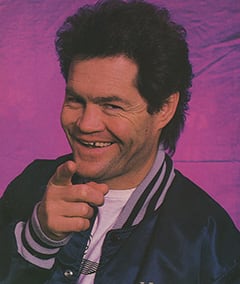
Plus you brought some semblance of the ’60s counterculture into American living rooms every week.
Dolenz: Timothy Leary hit the nail on the head. We came into the living room with long hair, and I think we had a massive effect on the consciousness of those kids and their parents. Because the kids finally could say “Look, mom, they have long hair—and they eat Kellogg’s!” If it hadn’t been us, it probably would’ve been somebody else—so I’m not saying that we were, you know, anything great. (Micky’s youngest daughter starts climbing on his lap, saying “Daddy!”) Uh, we have a little noise problem here, Ellie. Do you mind? But, again I think one of the reasons that it was so successful and that it’s sustained is that it wasn’t topical. It wasn’t satirical. The humor was essentially slapstick, Marx Brothers. John Lennon was the first one to make that comparison, and he hit the nail on the head long before I even perceived of it as that. When he was asked in ’67, “What about the Monkees versus the Beatles?” he said, (in a Liverpudian accent) “Well, there’s no contest. The Monkees are the Marx Brothers.” And he was absolutely right. We had nothing to do with each other, really. And the fact that the humor wasn’t topical or satirical had a lot to do with the reason that it’s so successful. Like Laugh-In, for instance, was a great show, but if you didn’t watch the news that week, you didn’t know what was going on. It was a great show. But The Monkees had nothing to do with topical humor. It was jokes about horses or…
Well, other than psychedelia, which was topical. But I guess that’s kind of lasted.
Dolenz: Well, there was this thread that used to run through. We used to make little comments whenever we could get them through. There would have been a lot more if the truth be known, but the network wouldn’t let us get away with it. Because the producers were quite hip, Schneider, Rafelson, Nicholson…
Is that how you got involved with Nicholson?
Dolenz: No, that was through Head. I’ll tell you that, too. That’s an interesting story. But even in the original show, we were always trying to sneak in little bits and pieces. Peter, mostly in the agit area, because he’s always been more agitated. Davy and I were actors, basically. We just wanted to do our comedy. Mike wanted to avoid it, but he had some things he wanted to say, especially in his music. Peter would’ve loved to get a little more in all the time. The networks essentially would not let us do anything. Then and still today, they have an iron grip on things in the sense of censorship. Once, when we did that lovely episode that won an Emmy called “The Devil & Peter Tork,” (The episode was nominated, but did not win.) the networks would not allow us to say the word “Hell.” Couldn’t say the word. And we started making jokes about it in the show. So we got away with a lot of that kind of stuff.
It’s funny that you mention Rolling Stone. I mean, they annihilated us at the time. And it’s funny that they’d come around now and recognize—as have a lot of people—what we were all about. Because that’s essentially what happened, and it went right over their heads in a funny way. I didn’t know this at the time. I didn’t even care. I had never heard of Rolling Stain magazine. I’d never heard of any of that stuff. It went over their heads in a way. Timothy Leary got it (laughs). God knows where he was at! And some of our contemporaries, like the Beatles, knew. They knew what was going on. And the kids knew, because we were talking to the kids. But the media didn’t get it, and that’s why they gave us so much shit. Also, I think there was probably a lot of jealousy, especially in the music end of the business. And I can’t blame them. We just kind went right over, breaking right through. We didn’t have to go the route that most groups had to go through.
Trina: Are the children going to disturb your tape?
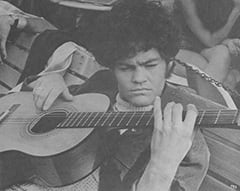
No, I think he’s talking loud enough to pick it up.
Dolenz: Are you sure? I hadn’t thought about that, actually.
This is OK. I’ve had worse environments before (Everyone laughs) Not that this is bad. This is great. I love little kids.
Dolenz: Well, we just thought… yeah, I love having them around. What was I saying? So, yeah, essentially, I’ve only recognized this in retrospect. We didn’t need that chain of command. We didn’t need those promoters or any of the powerful people at Rolling Stain. We didn’t need that because, suddenly, out of nowhere—the Monkees! Radio stations were forced to play our stuff. What’s more, it became successful. And so it pissed a lot of people off. And I don’t blame them in a way. Also, a lot of people couldn’t understand why it was working. Mike Nesmith made a lovely observation. He said, “The Monkees were like a circus. It was a massive, great circus tent with banners and lights—and nobody went inside. Everyone just saw the glitz outside.” Only now, 20 years later in retrospect, which happens occasionally, people are noticing that there might have been more there in substance. My belief is that you can’t fool all the people all the time. If there hadn’t been something there, it wouldn’t have worked as well as it did.
And it wouldn’t be happening again.
Dolenz: Right. You can’t hype people that much.
Wasn’t “Last Train To Clarksville” actually a hit before the TV series debuted?
Dolenz: It was doing quite well. Then the show came on the air, of course, and it just went through the roof. Having it on TV once a week certainly helped. I have no regrets, but I would’ve like for the music to have been a little more substantial. I always felt that the tracks were maybe just a little bit light. I didn’t know much about music. I still don’t. If I would’ve changed anything, I might’ve had the tracks a little heavier. I never had any complaints with the songs themselves. I always thought they were brilliant. And, again, they’ve been vindicated. I mean, Carole King, Neil Diamond, Harry Nilsson—they didn’t write trash. But I suppose, in retrospect, I might’ve had the tracks a little meatier. Again, that’s because of my rock ’n’ roll roots. Chuck Berry and that kind of stuff. But who knows? They might not have been as big of hits if that had been the case.
Well, they definitely stand up. You were going to tell me about Jack Nicholson.
Dolenz: Oh, yeah. Well, I mean, he was just introduced to me one day. I just remember him on the set. Bob Rafelson said, “Here’s a guy named Jack Nicholson, and I’d like to get involved with him doing a movie.” And we fell in love with him. I mean, instantly. The man has the most incredible charisma and personality of just about anyone I’ve ever met. And he was a “B” movie actor at the time. He’d been in a few motorcycle movies and stuff like that. I had lovely long talks with him about that. Again, he was a Monkees fan, and we had decided that we definitely did not want to make a 90 minute version of a Monkees show. In retrospect, I don’t know. It might have been a better idea. But I love Head. I personally think it’s a great film. And I’m very, very proud of it, even though I know it didn’t do very well.
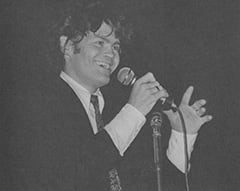
I just saw it on video again last week.
Dolenz: It’s so weird. I still don’t know what it’s all about. But I’m quite proud of it. But when we all met Jack, we fell in love with him and decided that we’d very much like to get involved with this guy. And we all went up to a golfing resort in northern California, and we all sat around a tape recorder for a weekend and just rapped or more like barnstormed. And then he went away and came up with Head. We all contributed in the sense that it was a joint effort. But he definitely went away and came up with that movie. It was pretty bizarre, very episodic—but that’s what we all wanted at the time. If we do a movie now, we’ll probably go and do a proper Monkees movie (laughs).
Are they going to bring out the 33 ⅓ Revolutions Per Monkee TV special on video or anything like that? Were you guys involved real heavily with that? I’ve never actually seen it.
Dolenz: Once again, it was very bizarre. It was very innovative for its time. Jack Good did it, and there were a lot of technical problems with it. There was a lot of fancy technical stuff that had never been attempted before on video tape. We were supposed to do it at NBC in the valley, and the musicians went on strike the week before we were supposed to tape. That’s why we had to shoot it on location, and nobody had ever shot videotape on location. And so they literally lifted up these machines and stuck them in the back of a pickup and drove them over to MGM. And I remember there being massively great problems. I haven’t seen it in so long, I don’t remember the details, but I remember having a good time doing it. I mean, that one scene with Little Richard, Fats Domino and Jerry Lee Lewis, all stacked up on top of each other on three white pianos! That alone has got to be worth having a copy of it.
Do you think ’60s music was superior to the music of today?
Dolenz: Oh, no. Not at all. First of all, “better” and “worse” are very subjective terms in relationship to art. And you’re getting in very dangerous territory when you start using words like that. I think that pop music—popular music—will always essentially be appreciated by the masses. Consequently, it will not be appreciated by the intelligensia. It’s a contradiction in terms. The first pop music was “Da da da” (hums Beethoven’s 9th). The purists at the time probably thought that it was appalling. Because at the time, it was purely… uh, Peter could come up with these terms, I can’t remember them. You know, music that doesn’t have a strong melody, but weaves in and out. That was considered purist. Then along comes pop music, which was essentially like… Liszt came out with good, strong melodies that had everyone humming, and he was annihilated by the musical press of the time. Popular music always has and always will be for the masses. Essentially, that has to mean something that people can identify with, can hum along with, can recognize, and sing with, all the way from Frank Sinatra through the Beatles and everything else. In the ’60s, there was a great sense of melody and hooks, and I would say that reached its peak during the ’60s. And then in the ’70s, it went to a very dance, disco, heavy instrumental kind of a thing. And I think it’s just come around naturally back to melodies and hooks. I mean, I listen to the radio today, and stuff by the Bangles, Mike & The Mechanics, Duran Duran—you know, “Manic Monday” is a song we would have done. Instantly. I wish we had. All that stuff. (Sings) “I believe in a miracle. All I need is you.” That is very Monkees in the sense of it being very simple, very melodic with a heavy catch phrase, and a big heavy hook. So I love the stuff that’s on the radio right now. And that was a very long way of explaining it.
Are plans for the future any more definite now than they were the last time we spoke?
Dolenz: It depends on who you’re talking to. Yes, actually they are.
I heard there might be a Broadway play.
Dolenz: Yeah. A Broadway musical.
When I first heard that, I thought it had to be a Marx Brothers thing.
Dolenz: No. I wish it was! No, I can tell you, even though it’s not firm. You can mention it as a rumor because there isn’t anything firm. It’s Hellzapoppin’. Which I think would be a lovely idea.
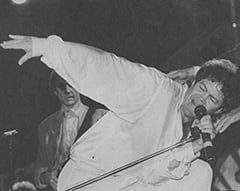
Oh, yeah. Jerry Lewis tried to do that a few years ago.
Dolenz: Yeah, but the problem is that he didn’t do the original play at all. He just used the name and did something totally different from the original production. We essentially would do the original. But we have lots of plans. An album. A special. A movie of the week. That last one’s actually been approved by ABC. It’s actually gone that far. And a feature film, which is the one I’m very interested in doing. A proper Monkees movie.
And Mike will probably be involved with that one?
Dolenz: Michael has said that he’d loved to be involved in anything. I don’t think he’ll get involved in recording. But as far as films and television, he’s said he would be involved.








